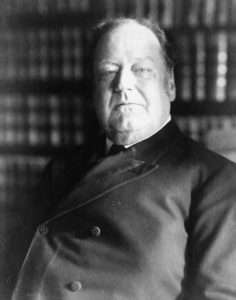The Volokh Conspiracy
Mostly law professors | Sometimes contrarian | Often libertarian | Always independent
Today in Supreme Court History: May 19, 1921
Editor's Note: We invite comments and request that they be civil and on-topic. We do not moderate or assume any responsibility for comments, which are owned by the readers who post them. Comments do not represent the views of Reason.com or Reason Foundation. We reserve the right to delete any comment for any reason at any time. Comments may only be edited within 5 minutes of posting. Report abuses.
Please to post comments



In re Whittington, 391 U.S. 341 (decided May 19, 1968): judge’s determination of juvenile as “delinquent” and therefore commitable to institution vacated and remanded to state court for redetermination with Fourteenth Amendment protections (privilege against self-incrimination, etc.)
Andrews v. United States, 373 U.S. 334 (decided May 20, 1963): a criminal defendant must be allowed to make a statement before being sentenced
Petrella v. MGM, 572 U.S. 663 (decided May 19, 2014): widow of co-writer of “Raging Bull” entitled to damages for copyright violation despite passage of 18 years since first alleged violation but entitled to only the past three years’ damages which is the statute of limitations for the statute allowing damages
Leary v. United States, 395 U.S. 6 (decided May 19, 1969): Marihuana Tax Act of 1937 (Timothy Leary was the accused) unconstitutional because it required persons not allowed to possess marijuana to declare it upon entering the country for tax purposes therefore requiring self-incrimination in violation of the Fifth Amendment (Act was repealed in 1970)
Barker Painting Co. v. Local No. 734, 281 U.S. 462 (decided May 19, 1930): Holmes refuses to rule on minimum wage law dispute because case got otherwise disposed of: “Both sides desired that the Court should go farther afield. But a Court does all that its duty compels when it confines itself to the controversy before it. It cannot be required to go into general propositions or prophetic statements of how it is likely to act upon other possible or even probable issues that have not yet arisen.”
Grubb v. Public Utilities Comm’n, 281 U.S. 470 (decided May 19, 1930): wrongful denial of application for proposed interstate bus line can be litigated in state court because federal court does not have exclusive jurisdiction over interstate commerce
Anderson v. Carkins, 135 U.S. 483 (decided May 19, 1890): Homestead Act violated by contract to sell land when seller (who had obtained the land from the government under the Act) lied about it being for his own use as required by the Act
Emsheimer v. New Orleans, 186 U.S. 33 (decided May 19, 1902): diversity jurisdiction is determined by residence at the time suit is filed, and is not destroyed by subsequent move (dispute over promissory note)
Fillippon v. Albion Vein Slate Co., 250 U.S. 76 (decided May 19, 1919): reversible error for judge to give instruction to jury without parties and their counsel being present (suit was for workplace injury)
Inyo County v. Paiute-Shoshone Indians of Bishop Community, 538 U.S. 701 (decided May 19, 2003): tribe could not sue under 42 U.S. §1983 because it protected only private persons and not sovereigns (issue was whether tribe had to comply with search warrant for records of employee accused of welfare fraud)
President-elect Warren Harding and former President William Howard Taft met at Harding's Ohio home on Christmas Day 1920. Taft was the most recent (and only living) Republican President, and Harding wanted his thoughts on potential Cabinet appointments. After a conversation that lasted about an hour, Harding asked Taft if he would be interested in a Supreme Court appointment, should one arise. Taft had not been expecting the question, giving a confused, non-committal answer, which Taft felt required a follow-up letter to Harding:
So, Taft would only accept the position of Chief Justice, and, as it happened, two months into Harding's term, Chief Justice White died, leaving the position available for Taft.
Taft was happier in that job than any other job. Also he was well suited to it. Even if it meant having to deal with McReynolds.
He even lost a lot of weight (though he still was hefty). He managed to get the Court docket down to manageable levels (there was a huge backlog since the number of cases continually increased) and got the Supreme Court its own building, though he never lived to see it. The decisions of the court were mixed, and sometimes horrible (Buck v. Bell, and child labor decisions) sometimes good (Pierce v. Society of Sisters, Moore v. Dempsey).
This guy again? Well, I may as well recycle my Chief Justice White jokes.
The Chief Justice served in the Confederate army, which apparently was the last time he went hungry.
Perhaps he had made the same oath as Scarlett O'Hara after the Civil War.
I've tried out that version of the joke before; maybe I'll do so again.
He looks like he’s saying, “That was an excellent (belch) four course breakfast!”